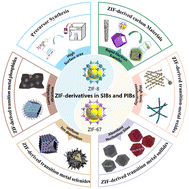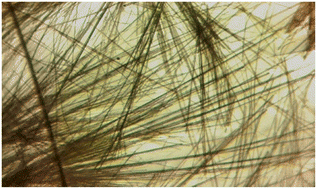Themed collection 2024 Highlight article collection

Polymorph transformation of solid drugs and inhibiting strategies
The importance of studying polymorph transformation of solid drugs, as well as the types, conditions, mechanisms, and inhibition strategies of polymorph transformation.

CrystEngComm, 2024,26, 6510-6544
https://doi.org/10.1039/D4CE00811A
Zinc sulfide: from supertetrahedral atomically precise clusters to quantum dots
Zinc sulfide clusters Zn10 with T3 symmetry and Zn8 with P1 symmetry are compared with zinc sulfide quantum dots from structures and properties views, which offer new insights for zinc sulfide material advancements.

CrystEngComm, 2024,26, 6378-6391
https://doi.org/10.1039/D4CE00731J
Comparing basal and prismatic slips induced by thermal stresses in 4H-SiC crystals
The slip stresses in 4H-SiC were calculated and the effects of the diameter were investigated. It was found that with the increase of the diameter from 6 to 8 inches, the prismatic slip more likely to occur but the basal slip hardly changes.

CrystEngComm, 2024,26, 6244-6254
https://doi.org/10.1039/D4CE00927D
Dynamic metal–ligand bonds in MFM-300: the use of semi-open metal sites to “teach an old dog new tricks”
This highlight aims to showcase the current advances in semi-open metal sites inherent to MFM-300(Sc) and MFM-300(In) to inspire new investigations to be carried out to develop new applications of this promising family of MOF materials.

CrystEngComm, 2024,26, 6100-6107
https://doi.org/10.1039/D4CE00865K
Urothermal synthesis of metal–organic frameworks
The use of urea derivatives as solvents for the preparation of metal–organic frameworks is reviewed.

CrystEngComm, 2024,26, 5978-5990
https://doi.org/10.1039/D4CE00859F
The application of supercritical fluid technology in the synthesis of metal and metal oxide nanoparticles
Supercritical hydrothermal synthesis of metals and metal oxides has extremely promising applications.

CrystEngComm, 2024,26, 5675-5693
https://doi.org/10.1039/D4CE00614C
Turning CO2 into treasure: the promise of metal–organic frameworks
The state of the art developments and the application of MOFs as suitable catalysts for capturing and converting CO2 into valuable chemical products are critically reviewed in this perspective.

CrystEngComm, 2024,26, 5489-5517
https://doi.org/10.1039/D4CE00688G
Metal–organic framework-derived materials for enhanced performance of aqueous zinc ion batteries: a mini review
An overview of different kinds of cathode and anode materials and their advantages for AZIBs.

CrystEngComm, 2024,26, 5314-5323
https://doi.org/10.1039/D4CE00774C
Recent progress in bimetallic-organic framework materials and their derivatives for supercapacitors
In this article, the preparation methods, morphology control and multi-components of bimetallic-organic frameworks and their derivative materials for supercapacitors are briefly reviewed.

CrystEngComm, 2024,26, 4935-4952
https://doi.org/10.1039/D4CE00483C
Organic charge transfer complex towards functional optical materials
The article highlights the recent developments on some interesting optical traits of organic charge transfer complexes. Properties like room temperature phosphorescence, thermally activated delayed fluorescence, circularly polarised luminescence, etc., are summarized.

CrystEngComm, 2024,26, 4751-4765
https://doi.org/10.1039/D4CE00701H
Overview of intentional formation of paired heteroatom sites in zeolite frameworks
Intentional placement of two heteroatoms in close proximity in zeolite frameworks is an important task for developing fine-tuned catalysts and ion exchangers and has been achieved via three different strategies.

CrystEngComm, 2024,26, 4405-4417
https://doi.org/10.1039/D4CE00505H
Multiple synthesis routes for atomically precise noble metal nanoclusters
This short review was designed to summarize the advances in synthesis methods of atomically precise metal nanoclusters.

CrystEngComm, 2024,26, 3998-4016
https://doi.org/10.1039/D4CE00488D
Cobalt(II) coordination polymers with single-ion magnet property
This highlight summarises recent advancements in cobalt(II) coordination polymers exhibiting single-ion magnet property.

CrystEngComm, 2024,26, 3771-3782
https://doi.org/10.1039/D4CE00512K
The synthesis and modification of LiFePO4 lithium-ion battery cathodes: a mini review
This review systematically investigates the lithium storage mechanism of LiFePO4 as well as its synthesis and modification strategies.

CrystEngComm, 2024,26, 3441-3454
https://doi.org/10.1039/D4CE00507D
Advancements in controlling COFs structure for enhanced crystallization properties and self-generated photocatalytic hydrogen peroxide
Highly crystalline COFs can improve the photocatalytic hydrogen peroxide yield.

CrystEngComm, 2024,26, 3143-3157
https://doi.org/10.1039/D4CE00420E
Ionic liquid-functionalized metal organic frameworks and their composite membranes for enhanced proton transport
Post-synthetic modification with ionic liquids is gaining prominence as a highly effective strategy for enhancing proton conductivity in metal–organic frameworks without significant structural changes.

CrystEngComm, 2024,26, 2450-2458
https://doi.org/10.1039/D4CE00186A
Discovery of new cocrystals beyond serendipity: lessons learned from successes and failures
A holistic understanding of reaction kinetics, the presence of catalysts, and annealing conditions can advance and accelerate the screening of elusive cocrystals, expediting the development of novel drug cocrystals for future clinical use.

CrystEngComm, 2024,26, 1505-1526
https://doi.org/10.1039/D4CE00021H
Zeolitic imidazolate framework derivatives as anode materials for sodium and potassium-ion batteries: a mini review
In this review, the functions and performance of ZIF derivatives in the anode materials of SIBs and PIBs are summarized comprehensively.

CrystEngComm, 2024,26, 1049-1066
https://doi.org/10.1039/D4CE00011K
Practical techniques for protein crystallization: additive assistance and external field intensification
Additives (ionic liquids, deep eutectic solvents, molecularly imprinted polymers) and external fields (magnetic field, electric field, ultrasonic field, shear, light field) enhance protein crystallization.

CrystEngComm, 2024,26, 897-912
https://doi.org/10.1039/D3CE00995E
Seeded growth of gold-based nanostructures regulated by controlled doping
Recent advancements in regulating the seeded growth of gold-based nanocrystals through controlled doping are discussed. By fine-tuning the doping process, a diverse range of innovative nanostructures can be created.

CrystEngComm, 2024,26, 735-747
https://doi.org/10.1039/D3CE00877K
Luminescent metal–organic frameworks as optical sensors for selective sensing towards Fe3+ and Cu2+
Luminescent metal–organic frameworks (LMOFs) have emerged as promising luminescent sensors for remarkable and selective sensing towards Fe3+ and Cu2+via a “turn-off/turn-on” strategy.

CrystEngComm, 2024,26, 577-593
https://doi.org/10.1039/D3CE01199B
Crystal growth and morphology control of needle-shaped organic crystals
In this highlight fundamental research on the growth of needle-like crystals and strategies to control the aspect ratio are reviewed.

CrystEngComm, 2024,26, 416-430
https://doi.org/10.1039/D3CE01041D
Durability of S- and N-doped graphene nanoplatelets for electrode performance in solid-state batteries
The main emphasis of the present Highlight paper is to summarise reported works aiming to understand the effect of sulfur and nitrogen doping on graphene nanoplatelets for high capacity electrodes in solid-state rechargeable energy storage devices.

CrystEngComm, 2024,26, 11-26
https://doi.org/10.1039/D3CE01111A
About this collection
This web collection contains the Highlight articles published in CrystEngComm in 2024.